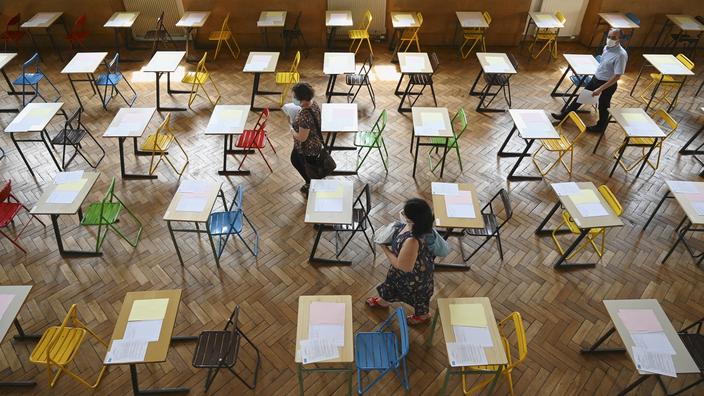Jean-Philippe Delsol is a lawyer and president of the Institute for Economic and Fiscal Research (liberal think-tank). He has notably published In
Praise of Inequality
(Manitoba, 2019).
To discover
Michel Houellebecq: "A civilization which legalizes euthanasia loses all rights to respect"
The baccalaureate never ceases to be reformed or tinkered with. Jean-Michel Blanquer has already announced a consolidation of continuous assessment which risks further lowering the level of this examination and making it discriminatory for students from the best and most demanding high schools. The baccalaureate, granted to 95% of candidates last year, is in fact under the influence of a frenzied egalitarianism announced since the establishment of the single college followed later by the idea of the bac for all. It is no longer a question of a diploma made to certify the end of secondary school rather than to justify a shipwrecked level of study.
It follows that many young people rush into university cycles that are not made for them.
They waste their time and embitter their troubles.
However, as public universities believe themselves obliged to show a certain benevolence in their end-of-year selection, their level of study in turn deteriorates.
In the end, and with some exceptions, entire age groups suffer from weakened education.
And this is also what leads to training teachers less intellectually equipped to face more difficult students, to the detriment of each other.
Foreign examples show that children are the winners of academic freedom because schools, in competition, and their teachers are more motivated.
Jean-Philippe Delsol
The generalization of entrance exams to universities could be a solution.
But it would only be a palliative.
To raise the quality of education, a basic response would consist in establishing academic freedom against the Napoleonic centralization which still weighs on French schools and universities.
Diversify the school
Public education, which no longer has the rigor of the black hussars of the Republic, has now demonstrated its inability to deliver the basics of knowledge to all and to promote the most promising students. Paradoxically, school is becoming more unequal than ever by submitting to a race to the bottom from which only those who find at home what school no longer offers them manage to extricate themselves. Greater freedom to create and manage educational establishments, under the control of the State responsible for avoiding abuses, would make it possible to offer diversified training courses adapted to the talents and capacities of each individual. Moreover, the state has no obligation or even a natural vocation to build schools and hire teachers, but only toto ensure that all children receive a correct instruction and to promote their education. In order for all children to be educated in the school of their parents' choice, the State could provide them with support by giving families a school voucher or voucher equivalent to payment for schooling (as in Sweden, for example) or by a subsidy. objective of independent schools (as with
Free schools
or academies in England, or
Charter schools
in the USA, or even as in the Netherlands).
Foreign examples show that children are the winners of academic freedom because schools, in competition, and their teachers are more motivated.
Private universities
Similarly, the monopoly of the graduation ceremony sclerosis the public university in a model that leads to failure: 56% of those who fail in the first year of the license (2018), only 30% of the students obtain their license in three years… Well Of course, these disastrous results are partly due to the level of the students who arrive at the university, but also to the centralization that this one undergoes, to the statute of civil servant of the teachers, to the insufficiency of competition. It emerges from a study conducted by IREF that the countries with the best universities, except Germany where apprenticeship takes precedence over higher education, are those where the share of the private sector in expenditure devoted to higher education is the most important. And the higher the share of private universities in thehigher education in the country, the higher the graduation rate.
The power of the United States is no doubt due in part to their university system despite their elementary and secondary schools probably as poor as ours.
Jean-Philippe Delsol
Of course, private universities are also paying. It is not unfair to ask to bear the cost of his studies to the student, major, who thanks to them will be able to earn more than the one who will have returned immediately in the world of work. This does not, however, exclude the most disadvantaged, whom, for example, American universities welcome in large numbers by offering them scholarships, student jobs, loans, partnerships with companies ... It is a way of empowering students. and inspire them to succeed. The power of the United States is no doubt due in part to their university system despite their elementary and secondary schools probably as poor as ours.
School and university pluralism cultivates the differences from which the pupils are enriched, and the autonomy of educational establishments is conducive to the learning of the autonomy of the pupils necessary for each of them. Students must be educated, but perhaps even more so, to allow them, in Pindar's words, to become what they are, to open up to a culture of questioning the depth of their ignorance, to manage uncertainty and the constant questioning of existence, accepting possible answers where we would so like certain answers. As such, academic freedom is desirable almost in an anthropological way to educate in the responsibility of oneself, prior to a better understanding of knowledge.It would also be the means of gradually transforming national education which is no doubt no longer able to cure itself of its ideological, union and statutory ills, but would perhaps come back under the pressure of competition. More than a question of education, it is undoubtedly a question of civilization.

